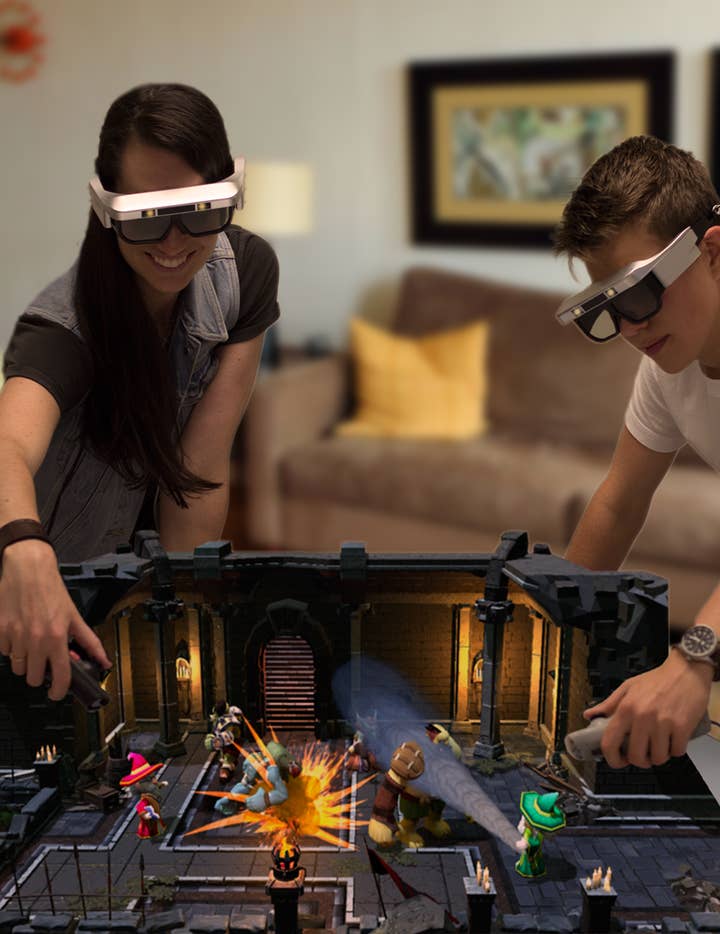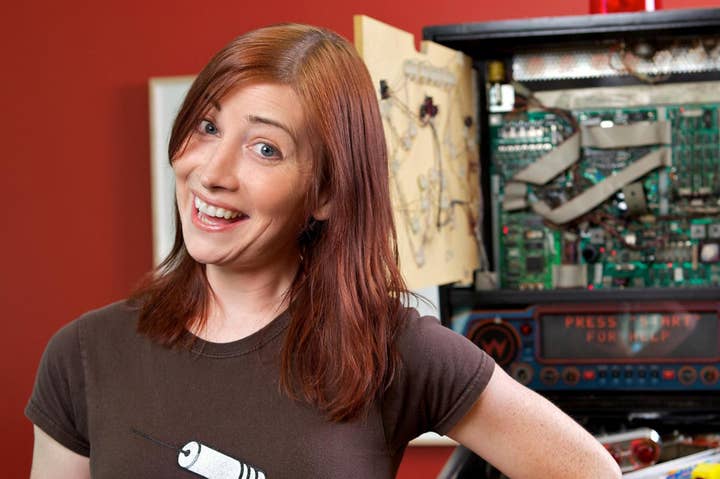CastAR's Jeri Ellsworth: Remember Star Wars holographic chess?
The (augmented) reality of building a cutting edge platform
Virtual reality is exciting, there's no denying that, but it has some limitations when it comes to social gaming, experiences that can be shared by people in the same room, children's sticky fingers and disregard for expensive electronics.
CastAR (formerly Technical Illusions) has the answer, offering an augmented reality experience that can be enjoyed by a huge demographic and crucially, together. The company was founded by Jeri Ellsworth and Rick Johnson, formerly of Valve, and recently secured $15 million in funding. GamesIndustry.biz spoke to Ellsworth about the challenges of working with, and communicating such an innovative experience.
Definitely seeing is believing. People fabricate what they think it's going to be in their mind and a lot of times when they put the glasses on for the first time they say "this is not what I expected." You get those reactions definitely.
And the fundraising, it took us a little while to refine our pitch deck to emphasize it. The very first time we went in to do a pitch when they had the demo it opened up 10,000 questions that were unrelated to where we wanted to go.
So then we changed our pitch deck to explain in simple pictures what it would mean for a kid to use it. So we had a picture of a kid with a Tonka Truck crushing a virtual building and it toppling over. The next slide was a family sitting around a table playing a soccer game, the next showed how a pro gamer would play.
We're still refining that, but through those visuals we can actually paint a pretty good picture of how it applies for different demographics. Sometimes we try to use analogies like "remember Star Wars holographic chess?"
I think it's going to boil down to influencers out in the market are going to drive it. There's going to be some early adopters and then they're going to take it over to their friend's house and their friend will be like "that was so fun, I'm going to go and get CastAR."
"Sometimes we try to use analogies like 'remember Star Wars holographic chess?'"
We actually look at the Wii quite a lot, it's a pretty interesting console. Everyone thinks of Nintendo as fun but they brought in a whole new older generation of gamers that would have been intimidated by the normal game controllers. We use that a lot in our thought process for how we make input devices like the wand.
The wand has evolved back and forth but we keep coming back to the same design, a stick that you can poke at things with a couple of buttons on it. Really relatable and easy to use and you can turn it sideways and it's the standard game controller. Things like that.
It's kind of a double edged sword. There's some very specific talents we want and it doesn't exist so we have to get some people that have promise in that area and build them up. But then there's a ton of people that are super excited, a lot of the other platforms are kind of topping out a little bit so this is the new exciting thing and they've dreamed about this their whole life and so we're actually getting quite a few folks like that in the company now.
It's been really exciting since we raised this money because the whole dynamic of the company is changing, there's a lot more buzz and excitement because new blood is coming in. For the last couple of years it's been just three people doing hardware and two people doing software, doing all of it.
It's been surprising, we've pulled some people out of companies that are big and pay really well and before we had our funding they worked at a fraction of the pay because it was so exciting.
We think that in the next couple of years we can define a really great living room experience or kids playing in the bedroom and we can nail that, and that's possible today. The dream of the full AR experience where you're immersed in it everywhere you go is so far out.
It depends on what we define AR as, I think we can have a completely magical experience if we limit it to a living room. I always try to think about my dad, how would he adopt something like this? So if I took a VR system to him and asked him to put it on it would be very hard to actually get him to release that much and go into to total virtual world. He probably would never buy it as a product, it's just too alien to him.
But if I could come up with some kind of device that's just familiar, like a game board that you put out and you slip on some non-intrusive glasses and now it's familiar. You interact the same way you would interact with a board game but there's some other cool stuff to it.
So this is the stair steps. We're going to have to stair step people into it, ease them into it, and I think our platform is the best for that because it's just going to be so easy for people to adopt.
It's hard to back up after you've catered to the hardcore people. VR has done that, they have a perfect niche in really hardcore game players but we're taking a different approach. We are going to hit the hardcore gamers. A hardcore gamer is going to go and play their intense VR thing but they're also going to have fun playing Settlers Of Catan on CastAR. We're going to get my father, we're going to get people who are 40 years old, mothers, children that are eight years old crushing things with Tonka Trucks. I think we cover a broad spectrum.
"We're going to get my father, we're going to get people who are 40 years old, mothers, children that are eight years old crushing things with Tonka Trucks"
We definitely think about it on the physical side. We don't know if we're going to be able to achieve something an eight year old can use but it's on our radar. If we make it good for an eight year old does it make it so that someone who is eighty years old can't use it? It's a balancing act. Somewhere farther down the road there could be customized versions, economy, kid versions that they can just break and destroy, and then the pro gamers that have to have the best.
But our main focus in the short term is I think we can nail a product that spans a lot of demographics right out of the gate and then we can divert a little bit after that.
Rick [Johnson] and I just love to dream about all these things that we can do and our CEO came on board and helped focus us. "You guys are going to be the platform that enables all these big things, you don't have to take it all on yourself. Think of it more as a set of tools."
So we're the tools and that's exciting because it can be very distracting to think about all the different things you can do.
Oh yeah, and some of our investors are steeped in the games industry, some bigger companies are talking to us. I can't really announce any of that stuff.
There's a lot of companies that are in a stagnant or flattened off market and they're looking for fertile ground to launch the next round of profits for them and there are companies full of enthusiast game types who are just looking for that new entertainment experience. It's exciting having all these people traipse through the office.



